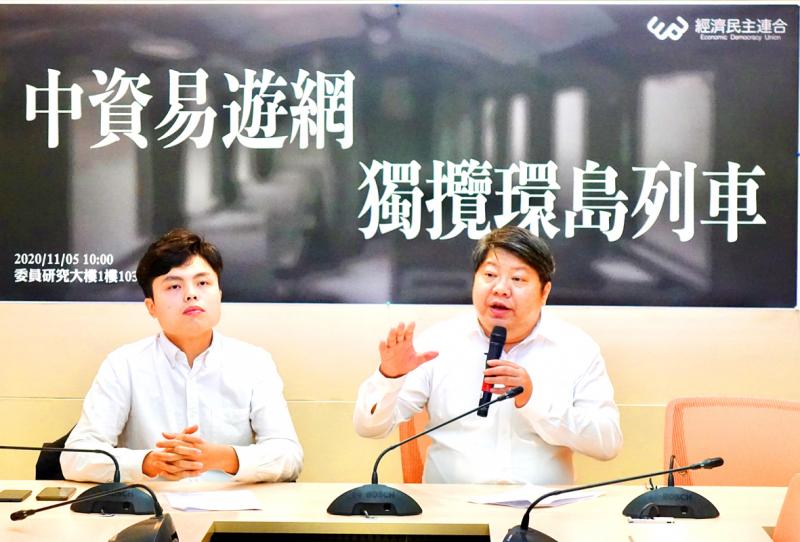The government should investigate allegations of Chinese dominance of Taiwan’s largest online travel agency Web site, ezTravel, representatives of two civic groups said at a news conference at the Legislative Yuan in Taipei yesterday.
Under the Act Governing Relations Between the People of the Taiwan Area and the Mainland Area (臺灣地區與大陸地區人民關係條例) and other laws, it is illegal for Chinese companies or investors to manage or own travel agencies, Taiwan Citizen Front Secretary-General Chiang Min-yen (江旻諺) said.
Chiang also questioned how ezTravel — given its Chinese investment — has continued to win management of the Taiwan Railways Administration’s (TRA) round-island train travel programs.

Photo: Tu Chien-jung, Taipei Times
Economic Democracy Union convener Lai Chung-chiang (賴中強) said that ezTravel shares are evenly split between two Cayman Island-registered companies, CTrip.com and Cyberccn.com.
CTrip is owned by Trip.com, whose nine board members are all Chinese, including two — Shen Nanpeng (沈南鵬) and Lee Yenhong (李彥宏) — who are members of the Chinese People’s Political Consultative Conference, Lai said.
Of the five seats on ezTravel’s board, two seats belong to Ctrip — including one held by Trip.com chief executive Sun Jie (孫潔) — two are held by Cyberccn.com and the other is held by former Trip.com vice president Xing Xiong (邢雄), Lai said, citing Ministry of Economic Affairs data.
“It is evident that Trip.com completely owns ezTravel’s board,” Lai said.
The ministry should order Trip.com to withdraw its investment and strip Sun and Xiong of their board seats, which have not been approved by the government, Lai said.
Chiang called on the government to penalize travel agencies that have not declared that they have received Chinese investment.
Pressed by reporters, Minister of Economic Affairs Wang Mei-hua (王美花) said that ezTravel had obtained its license as a foreign-invested company.
The ministry would look into its licensing should any concerns or new evidence arise, she said.
Investment Commission Executive Secretary Chang Ming-pin (張銘斌) said that previous investigations found that while ezTravel has Chinese investors, their share of its stock had not exceeded the 30 percent permitted by law.
However, the commission would ask the firm to provide additional information, Chang said.
Responding to the allegations, ezTravel said it is a legitimate local company that has been in business for more than 20 years, and it is completely independent and autonomous.
As for the question of how it has been able win management of the TRA’s travel program year after year, ezTravel said that the Economic Democracy Union had failed to examine the proposals and program offers made by other bidders.
It is sad that its efforts to promote railway tourism have been undermined by allegations, ezTravel said.

CHAOS: Iranians took to the streets playing celebratory music after reports of Khamenei’s death on Saturday, while mourners also gathered in Tehran yesterday Iranian Supreme Leader Ayatollah Ali Khamenei was killed in a major attack on Iran launched by Israel and the US, throwing the future of the Islamic republic into doubt and raising the risk of regional instability. Iranian state television and the state-run IRNA news agency announced the 86-year-old’s death early yesterday. US President Donald Trump said it gave Iranians their “greatest chance” to “take back” their country. The announcements came after a joint US and Israeli aerial bombardment that targeted Iranian military and governmental sites. Trump said the “heavy and pinpoint bombing” would continue through the week or as long

TRUST: The KMT said it respected the US’ timing and considerations, and hoped it would continue to honor its commitments to helping Taiwan bolster its defenses and deterrence US President Donald Trump is delaying a multibillion-dollar arms sale to Taiwan to ensure his visit to Beijing is successful, a New York Times report said. The weapons sales package has stalled in the US Department of State, the report said, citing US officials it did not identify. The White House has told agencies not to push forward ahead of Trump’s meeting with Chinese President Xi Jinping (習近平), it said. The two last month held a phone call to discuss trade and geopolitical flashpoints ahead of the summit. Xi raised the Taiwan issue and urged the US to handle arms sales to

BIG SPENDERS: Foreign investors bought the most Taiwan equities since 2005, signaling confidence that an AI boom would continue to benefit chipmakers Taiwan Semiconductor Manufacturing Co’s (TSMC, 台積電) market capitalization swelled to US$2 trillion for the first time following a 4.25 percent rally in its American depositary receipts (ADR) overnight, putting the world’s biggest contract chipmaker sixth on the list of the world’s biggest companies by market capitalization, just behind Amazon.com Inc. The site CompaniesMarketcap.com ranked TSMC ahead of Saudi Aramco and Meta Platforms Inc. The Taiwanese company’s ADRs on Tuesday surged to US$385.75 on the New York Stock Exchange, as strong demand for artificial intelligence (AI) applications led to chip supply constraints and boost revenue growth to record-breaking levels. Each TSMC ADR represents

State-run CPC Corp, Taiwan (CPC, 台灣中油) yesterday said that it had confirmed on Saturday night with its liquefied natural gas (LNG) and crude oil suppliers that shipments are proceeding as scheduled and that domestic supplies remain unaffected. The CPC yesterday announced the gasoline and diesel prices will rise by NT$0.2 and NT$0.4 per liter, respectively, starting Monday, citing Middle East tensions and blizzards in the eastern United States. CPC also iterated it has been reducing the proportion of crude oil imports from the Middle East and diversifying its supply sources in the past few years in response to geopolitical risks, expanding